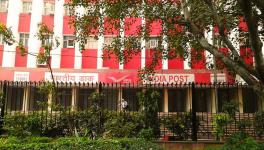How did BJP Increase Its Tally Despite Intense Protests over CAB in Assam

Representational image. | Image Courtesy: Business Insider India
In the recently concluded Lok Sabha elections, the country witnessed a Bharatiya Janata Party wave, barring a few South Indian states. Assam too, which had recently been in the grip of intense protests against Citizenship (Amendment) Bill 2016, has synced itself with the mood of the nation, going in favour of the BJP in more than 50% of the seats.
Even in the Panchayat Elections held in the state in December 2018, few months before from the national polls, the Congress fought the BJP almost neck-to-neck. However, this time in the LS polls, Congress got only 3 seats out of 14, the same number that it had got in 2014. Among the regional parties, BJP allies- Bodoland People's Front (BPF) and Asom Gana Parishad (AGP) could not manage any seat, while AIUDF lost one, but retained one.
It was only a few months ago, that the Krishak Mukti Sangram Samiti (KMSS) and All Assam Students’ Union (AASU), among 70 other organisations, had rocked the state on the CAB issue against BJP. Even though the state's ruling party seemed to be on the back foot multiple times, but the Lok Sabha elections has changed the perception and opened the gate of introspection for almost all parties and organisations in the state. Clearly, the Assamese intelligentsia and organisations failed in their test against the BJP. Why and how they failed are the two big questions which arise now.
Before diving deep into the reasons of the BJP's success and failure of the anti-CAB movement, let’s take a look into the voting trends in Assam.
Also read: Elections 2019: No Achhe Din for Paper Mills of Assam
BJP got 9 seats, Congress 3, All India United Democratic Front 1, while an independent candidate beat the BJP Ally in Kokrajhar
Unexpected Wins
Firstly, the two unexpected wins for BJP in the Barak Valley region. In both the seats of Karimganj and Silchar in the Bengali-majority valley, even the BJP had not expected a win.
In Karimganj, where BJP had fielded Kripanath Mallah, the deputy speaker of the BJP-ruled state Assembly, the party has clinched the seat from AIUDF's Radheyshyam Biswas by a meagre margin of only 38,389 votes. Biswas had won the seat in 2014 by a huge margin of more than one lakh votes, defeating the Congress candidate. The seat has a majority Muslim population, and so it was expected that it will go in favour of the AIUDF once again. However, a recent rift in the Hailakandi District Congress, which falls under the Karimganj seat, apparently led to the AIUDF defeat here. In Hailakandi, Congress heavyweight Gautam Roy reportedly went against his own party and asked all Hindus to vote in favour of the BJP, leading to both Congress’ and AIUDF’s failure in the seat.
Following the ruling party’s victory in the seat, Roy distributing sweets has gone viral on social media. Congress usually gets both Hindu and Muslim votes in Hailakandi, which were clearly polarised in the district, and the Roy-loyal Hindu Bengalis allegedly voted for the BJP. In addition, the anti-incumbency factor also worked well against AIUDF candidate Biswas here. In 2014, Biswas got a significant portion of the lower-caste Namasudra votes, himself being one, which he missed this time as allegedly he did little for the community during his tenure. The third issue is Mallah's recent elevation to the deputy speaker post, which worked in his favour, as per the local analysts.
Also read: Elections 2019: Assam Tribes Want ST Status, But Not in Lieu of CAB
While Karimganj was a loss for the Bengali Muslims of the Barak Valley, Silchar was a prestige issue for the Indian National Congress (INC), as its candidate Sushmita Dev is the daughter of deceased Congress heavyweight Santosh Mohan Dev, a 7-times winner, who had the "rare distinction of being elected from two different states" — Assam and Tripura. Here, BJP fielded Rajdeep Roy, son of veteran BJP leader late Bimalangshu Roy, who had won the state Assembly polls twice from the Silchar Assembly seat. Roy defeated Dev by a margin of only 35,241 votes. The fourth-generation Congress leader, Dev, lost mainly due to polarisation, while the All India Mahila Congress president has also been perceived as inaccessible by the villagers. She received maximum votes from the Muslims in Silchar, as in the Hindu-Bengali majority Silchar constituency, the BJP candidate received nearly 50 thousand more votes than her. This is a clear verdict in favour of CAB, on which she allegedly maintained a dual stand by walking away from a Joint Parliamentary Committee meet (of which she was a member) that had been formed to decide the fate of CAB, making both Muslims and Hindu Bengalis angry with her.
The Losses and Gains of BJP and Congress
Among the rest of the 12 seats, the BJP got the people's mandate in 7. While BJP retained 6 of its previous winning seats — Gauhati, Dibrugarh, Lakhimpur, Tezpur, Jorhat and Mangaldoi — it has lost the Nowgong seat to Congress heavyweight Pradyut Bordoloi. In 2014, BJP's Rajen Gohain had won the seat but this time he lost the ticket amid controversy surrounding a sexual harassment case against him. This time, BJP fielded a new face Rupak Sharma, who gave a strong fight against Bordoloi, in which the Congress candidate won by a meagre margin of only 16,752 votes. BJP, however, patched up the loss of Nowgong by clinching the only hill district seat, the Autonomous Council Seat, a.k.a, Diphu seat — from Congress's Biren Singh Engti. Here, peddling on the anti-incumbency wave against Engti, the BJP's new face Horen Sing Bay won by a huge margin of 2,39,626 votes. The results in both Nowgong and Diphu seats went as how NewsClick had predicted earlier.
While BJP won 9 seats, increasing its tally by 2 more seats this time, the Congress party has seen both losses and gains, but the party was stuck with only 3 seats this time too. While it lost both adjacent seats — Silchar and Diphu — it gained two in Barpeta and Nowgong. In Muslim majority Barpeta, in a triangular fight between the AIUDF, Congress and AGP, the Congress candidate Abdul Khaleque came out as the victor with a comfortable margin of 1,40,307 votes, leaving AGP's Kumar Deepak Das at the second position.
Fate of the Regional Parties Sealed?
While AIUDF lost two of its previous wins at Karimganj and Barpeta, the party chief-cum-perfume-business tycoon Badruddin Ajmal retained his Dhubri seat with a whopping margin of 2,26,258 votes.
Two BJP allies, the BPF and AGP both lost miserably. While BPF's Pramila Rani Brahma came second in the Kokrajhar seat, which famous ex-ULFA leader Naba Kumar Sarania retained as an independent candidate, AGP lost in all three seats the ally BJP had left for it — Kaliabor, Barpeta and Dhubri. The only strong candidate it fielded this time was in Kaliabor, ex-AASU leader Moni Madhab Mahanta.
With AGP's massive defeat, BPF's loss and AIUDF losing two of its seats, this round of polls has somehow sealed the fate of regional parties.
Also read: Has BJP Really Won the Assam Panchayat Polls?
Why and How Anti-CAB Movement Failed
While it was clear from the mandate of Panchayat elections that the CAB issue was not the priority of common Assamese folks, the Lok Sabha polls have made it clear that CAB is not the real issue for the Assamese people who are faced with multiple other issues.
Hara Kumar Goswami, a social activist associated with a pan-Indian forum called the Forum for Social Harmony, said, "Assam's demography is not supposed to be in the BJP's favour, but the way the RSS network has spread all over the state in the past few years, especially, since the BJP came to power in the state, only those issues related to communalism have come to the forefront. The core issues on which movements should have been launched, such as removal of the state’s special status, closure of two large paper mills, erosion and flood issues, selling of the state-owned oil industries to multi-national firms, did not happen. The only issue to be highlighted was CAB.”
He added, “The opposition failed to take up any of these issues, including even the very serious unemployment issue. They also completely ignored the tea-estate workers' issues. Congress also failed to take any bold stand on the National Register of Citizenship issue, which is why a majority of Hindu Bengalis living in both Brahmaputra and Barak valleys, gave their mandate in favour of the BJP. Apart from this, there was no united stand of the opposition. These all went in favour of the BJP.”
The writer is an independent content management consultant based in Assam.
Read more: Elections 2019: Upper Assam Tea Tribes Angry with BJP for Failing to Hike Daily Wage
Get the latest reports & analysis with people's perspective on Protests, movements & deep analytical videos, discussions of the current affairs in your Telegram app. Subscribe to NewsClick's Telegram channel & get Real-Time updates on stories, as they get published on our website.
























